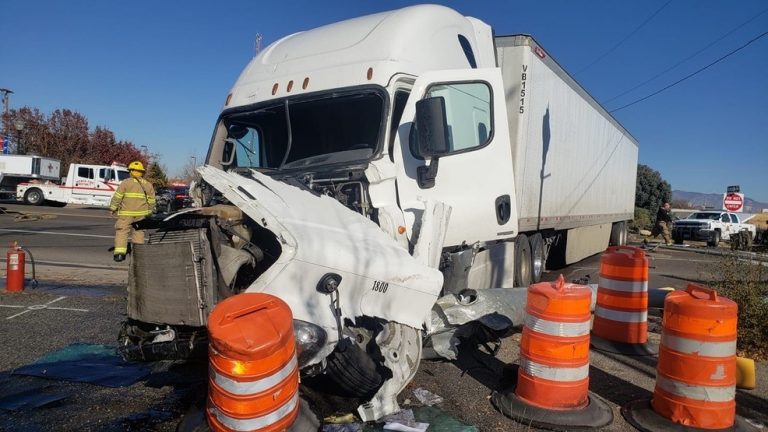
Fatalities and serious injuries are frequent outcomes of truck accidents, which can often cause substantial property damage. It’s critical to comprehend the legal procedure that follows if you or a loved one has been in a truck accident in Las Vegas. The first step in pursuing justice and compensation is to work with a qualified truck accident attorney.
Here, we will provide a thorough overview of the difficult process of truck accident litigation by outlining the typical procedures in a case handled by a Las Vegas Truck Accident Lawyer.
First Consultation
Initial consultation is where the journey starts. The truck accident attorney assesses the accident’s specifics during this meeting. Talking about the precrash, the disaster, and its aftermath are all part of this. Prior to representing you, the attorney will obtain the following:
- Date, time, and location of the accident
- Details of the involved parties
- Police and medical reports
- Insurance information
This consultation is crucial for both the client and the lawyer. It allows the lawyer to assess the potential for a successful claim and helps the client understand their legal options. Many law firms offer this initial consultation free of charge.
Investigation
If the lawyer decides to take on the case, a thorough investigation follows. This step is essential to build a strong foundation for the claim. The investigation may include:
Gathering Evidence
The collection of evidence is crucial in establishing both liability and damages. Key pieces of evidence include witness statements, photographic evidence, expert testimonies, and documented financial losses. Key pieces of evidence include:
Police Reports
These provide an official account of the accident, including any citations issued.
Medical Records
Documenting injuries and treatments helps in assessing the extent of damages.
Witness Statements
Eyewitnesses can offer crucial perspectives on how the accident occurred.
Photographs and Videos
Visual evidence from the accident scene and damaged vehicles can illustrate the severity of the collision.
Reviewing Regulatory Compliance
Truck drivers and trucking companies are subject to federal and state regulations. The semi truck accident attorney will review:
Driver Logs
Driver logs are essential for checking compliance with hours-of-service (HOS) regulations. These logs record the hours a driver spends on the road, rest periods, and breaks. By reviewing these logs, we can identify if the driver violated HOS regulations, which are designed to prevent fatigue-related accidents. Violations can provide evidence of negligence and are critical in establishing liability in a trucking accident.
Maintenance Records
Maintenance records are crucial for ensuring that the truck was properly maintained. These records include information on routine inspections, repairs, and any issues reported by drivers. Proper maintenance is vital for the safe operation of a truck. By examining these records, we can determine if the trucking company neglected necessary upkeep, which could have contributed to the accident. Poor maintenance practices, such as ignoring brake repairs or failing to address tire issues, can be pivotal in proving negligence.
Company Policies
Reviewing the trucking company’s policies helps to ascertain whether they adhered to safety regulations. Company policies should comply with federal and state laws regarding truck operation, driver training, and safety protocols. Analyzing these policies can reveal if the company encouraged unsafe practices or cut corners to increase profits. Any deviation from standard safety regulations can support a claim of corporate negligence.
Consulting Experts
In complex trucking accident cases, consulting with experts is often necessary. Accident reconstructionists can analyze the crash scene, vehicle damage, and data from electronic logging devices to recreate the events leading up to the accident. Medical professionals can provide insights into the extent of injuries and their long-term impact on the victim’s life. Economists can calculate the financial losses suffered, including medical expenses, lost wages, and diminished earning capacity. These experts provide detailed reports and can testify in court to strengthen the claim.

Filing the Claim
Once sufficient evidence is gathered, the lawyer will file a claim against the responsible parties. This typically includes:
The Truck Driver
If negligence such as distracted driving or intoxication is involved.
The Trucking Company
For issues like inadequate training or poor maintenance.
Manufacturers
If a vehicle defect contributed to the accident.
Government Entities
If road conditions or signage played a role.
The claim outlines the basis of the case, the extent of damages sought, and the legal grounds for the lawsuit.
Negotiation and Settlement Talks
Most personal injury cases, including truck accidents, are settled out of court. The lawyer will negotiate with the insurance companies and other parties involved. This stage involves:
Demand Letter
The best accident lawyer sends a demand letter to the defendant’s insurance company. This letter details:
- The facts of the case
- Liability arguments
- Injuries and damages sustained
- The compensation amount sought
Negotiations
Insurance companies often counter with lower offers. The lawyer will negotiate to reach a fair settlement. This process may involve several rounds of offers and counteroffers. The lawyer’s goal is to maximize the client’s compensation without the need for a prolonged court battle.
Filing a Lawsuit
If settlement negotiations fail, the Las Vegas drunk driving accident lawyer will proceed to file a lawsuit. This step involves:
Complaint Filing
The lawyer files a formal complaint with the court, detailing the case’s specifics and the damages sought. The defendant will be served with the complaint and given a deadline to respond.
Discovery Phase
The discovery phase is a critical part of the litigation process, where both sides exchange information. This phase includes:
- Interrogatories: Written questions that the other party must answer under oath.
- Depositions: Oral testimonies taken under oath, often involving witnesses, experts, and the involved parties.
- Document Requests: Asking the other party to provide relevant documents.
Pre-Trial Motions
Lawyers may file pre-trial motions to shape the trial’s course. Common motions include:
- Motions to Dismiss: Arguing the case should be thrown out due to lack of legal grounds.
- Summary Judgment Motions: Requesting the court to decide the case based on facts that are not in dispute.
Trial
If the case goes to trial, both sides will present their arguments in court. The trial involves several stages:
Jury Selection
In cases with a jury, the selection process involves questioning potential jurors to ensure a fair and impartial jury.
Opening Statements
Both sides present their opening statements, outlining their case to the jury.
Presentation of Evidence
The plaintiff (your lawyer) will present evidence first, followed by the defense. This includes:
- Witness Testimonies: Both eyewitnesses and expert witnesses.
- Cross-Examinations: Each side questions the other’s witnesses to challenge their credibility and statements.
Closing Arguments
Both sides summarize their cases, emphasizing key evidence and arguments.
Jury Deliberation and Verdict
The jury deliberates and reaches a verdict, deciding liability and, if applicable, the amount of damages to be awarded.
Post-Trial
After the trial, several steps may follow, depending on the outcome:
Appeals
If either party is dissatisfied with the verdict, they may file an appeal. The appellate court reviews the trial court’s decisions for legal errors.
Collecting the Judgment
If the plaintiff wins, the lawyer assists in collecting the awarded damages. This might involve working with the defendant’s insurance company or pursuing other methods of collection if the defendant is uninsured.
Settlement
Even after a verdict, parties sometimes reach a settlement to avoid prolonged appeals. The lawyer negotiates terms favorable to the client.
Why Hiring a Las Vegas Truck Accident Lawyer is Crucial
Truck accident cases are often complex due to the involvement of multiple parties and stringent regulations governing the trucking industry. A specialized lawyers like Dr. Patti & Associates bring invaluable expertise, ensuring all legal angles are covered and the client’s rights are protected.
Expertise in Trucking Regulations
Understanding the intricacies of federal and state trucking regulations is crucial in building a solid case. An experienced truck accident lawyer is well-versed in these laws and knows how to leverage them in the client’s favor.
Investigative Resources
Law firms handling truck accidents have access to resources that can aid in thorough investigations. From accident reconstruction experts to forensic specialists, these resources are pivotal in substantiating the claim.
Negotiation Skills
Insurance companies are known for minimizing payouts. A skilled lawyer negotiates aggressively, ensuring the client receives fair compensation for their injuries, suffering, and losses.
Litigation Experience
If the case goes to trial, having a lawyer with courtroom experience is essential. They present the case compellingly, increasing the chances of a favorable verdict.
Conclusion
Navigating a truck accident case in Las Vegas involves multiple steps, each requiring meticulous attention to detail and legal expertise. From the initial consultation to the potential trial and post-trial proceedings, a seasoned Personal Injury Attorney Las Vegas guides clients through the process, advocating for their rights and striving for the best possible outcome. If you or a loved one has been involved in a truck accident, securing a knowledgeable lawyer is a crucial step toward justice and recovery.
